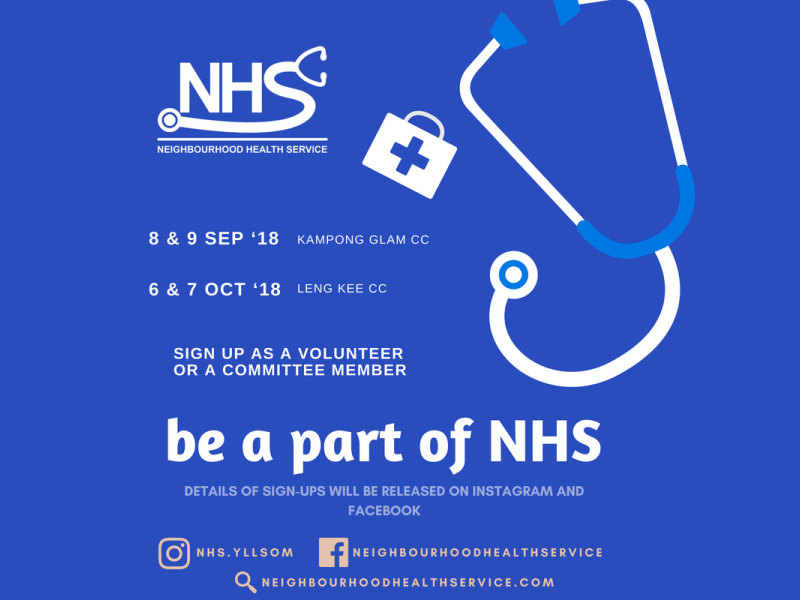Neighbourhood Health Service Now A Nationwide, Inter-professional Community Health Service
By Benjamin Tan Kye Jyn, Koh Ying Ying & Alicia Yip Swee Yan
Project Directors & Publicity Head
Phase II Medicine students
The mission
In 2007, a small group of enthusiastic medical students found a gap in the healthcare system that they believed they could help bridge. They pooled what little resources they had, garnered the support of their teachers, and introduced Singapore’s first student-organised health screening.
Twelve years later, the Neighbourhood Health Service (NHS) has grown by leaps and bounds to become NUS Medicine’s iconic community service project. It is the only student-led School project that has nationwide reach and scale – partnering all three Regional Health Systems to serve more than 5,000 residents in nine different districts, from Taman Jurong to Eunos Crescent.
NHS remains an NUS Medicine student-led initiative, but we now welcome student volunteers from Singapore’s two other medical schools – the NTU Lee Kong Chian School of Medicine and Duke-NUS Medical School. We also increasingly play a key role in inter-professional education by engaging nursing, social work, physiotherapy and occupational therapy students from NUS, Nanyang Polytechnic and Singapore Institute of Technology.
While many things have changed since 2007, one thing has not – our core ethos of serving the underserved. We found that lower-income residents living in HDB rental blocks are four times less likely than the average Singaporean to go for regular health checkups – hence our mission to reach out to them at their doorsteps.
Going beyond the basics
Today, NHS is more than just another health screening.
We bring a comprehensive, holistic health service right to the doorsteps of residents-in-need. This is especially convenient for immobile residents, who are thus encouraged to participate. Our screening module comprises five distinct categories – chronic diseases, functional, mental health, frailty, and cancer. Each contains multiple modalities and add to a total of 26.
The work does not stop there. NHS continues to engage more than 300 residents with abnormal results through our comprehensive follow-up programme. The aim is not to replace primary care physicians, but to motivate these residents to see GPs to follow up on on their screening results. To ensure that they do so, our committee members – trained in motivational interviewing techniques frequently used by family medicine physicians – engage residents via phone calls (and house visits in more complex cases). This happens at regular 3-monthly intervals, for up to a year after these residents’ last screening, thus encouraging positive health-seeking behaviour.
Crucially, we take a holistic view on health. We are well aware that healthcare decisions are always influenced by socio-economic factors. Thus, NUS Social Work students form a core part of our committee and volunteer group. They work tirelessly to connect residents-in-need to social support organisations, in order to overcome socio-economic barriers to healthcare.

NHS partners the National Dental Centre Singapore (NDCS) to provide a basic dental check-up and follow-up referrals to CHAS dentists in the vicinity.

NHS student volunteers engaging residents in health education through a modified Snakes and Ladders game.
2018 screenings
This year, NHS will be holding two screenings. It will be our second year serving the residents of Kampong Glam, and our first year in Queenstown.
8 – 9 September 2018
Kampong Glam Community Club
6 – 7 October 2018
Leng Kee Community Club (Queenstown)
You can help to make a difference!
If you are a healthcare professional and you would like to give a few hours of your time to our residents, please contact us at yllsom.nhs@gmail.com. We are always looking for passionate volunteers who can help provide residents with meaningful health advice to guide their healthcare choices. Any help would be greatly appreciated!
The NHS family also welcomes NUS Medicine and Nursing students to volunteer with us and make a difference today. Here at NHS, we spare no effort in creating a meaningful experience for volunteers and enabling skills development, which includes training where necessary. You will learn how to walk a resident through the entire screening – as opposed to performing a repetitive, specialised task for the whole day. This means engaging in conversation, befriending the resident, taking his/her blood pressure (don’t worry M1s, we’ll train you!), and even motivating the resident to adopt healthy lifestyle habits. These are all skills that you will need as doctors and nurses – so why not start now?
On top of that, many of our volunteers receive the opportunity to conduct door-to-door health screenings for less mobile residents. We believe the interaction with these residents will be an instructive and transformative one that will help you to become a more compassionate and empathetic person.
If you’re ready to devote (not just a few hours but a year of) your time to this worthy cause, NHS is also looking forward to expanding our committee! Incoming first year NUS Medicine and Nursing students are welcome to sign up as committee members. The main committees are: (1) Operations (2) Follow-up (3) Volunteer Management (4) Logistics (5) Publicity, Health and Community Outreach (PHCO) (6) Research and Development. Recruitment for NUS Social Work and NTU Lee Kong Chian School of Medicine committee members will be conducted separately.
More details on NHS and how to sign up as a volunteer or committee member will be released on our social media platforms below:

